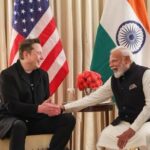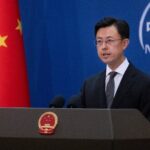High-Stakes Discussion as AI Chip Wars Heat Up
Jensen Huang, CEO of Nvidia, met with former U.S. President Donald Trump on Friday as the AI chip giant faces increasing pressure from escalating U.S.-China trade tensions. The meeting comes at a critical moment when Washington is tightening restrictions on semiconductor exports to China, a move that has significantly impacted Nvidia’s business and stock performance.
The discussion reportedly centered around U.S. AI leadership, trade policies, and Nvidia’s role in the AI revolution, highlighting the growing intersection of geopolitics and technology.
Nvidia’s China Challenges: Export Curbs & Market Volatility
Nvidia, a dominant force in AI chip manufacturing, has been hit hard by U.S. restrictions on semiconductor exports to China.
- U.S. Export Bans: In October 2022 and 2023, the Biden administration imposed strict controls on AI chip exports, limiting China’s access to Nvidia’s cutting-edge H100 and A100 GPUs—critical components for AI training and supercomputing.
- China’s Response: In retaliation, China has accelerated domestic chip development, posing a long-term challenge to U.S. tech firms. Nvidia’s rival, Huawei, recently launched its Ascend 910B AI chip, intensifying the competition.
- Stock Market Impact: Nvidia shares suffered a sharp drop this week, reflecting concerns over lost Chinese revenue, increased U.S. regulatory scrutiny, and growing AI competition.
With China contributing nearly 20% of Nvidia’s data center revenue, the company is navigating an uncertain future in one of the world’s largest AI markets.
Trump’s Role in AI & Tech Policy
Donald Trump, the Republican front-runner for the 2024 U.S. presidential election, has been vocal about strengthening American manufacturing and reducing reliance on China.
During his presidency, Trump:
- Imposed tariffs on Chinese tech imports, sparking a trade war.
- Restricted Huawei and other Chinese firms from accessing U.S. semiconductor technology.
- Promoted “America First” policies to boost domestic chip production.
Huang’s meeting with Trump suggests Nvidia may be seeking political assurances or lobbying for AI-friendly policies if Trump returns to the White House.
Nvidia’s Strategic Moves to Bypass China Curbs
Despite U.S. sanctions, Nvidia has attempted to adapt by:
- Developing downgraded AI chips (H800 & A800) specifically for China to comply with U.S. regulations.
- Expanding production in non-China markets, including India and Southeast Asia.
- Strengthening AI partnerships with U.S. cloud giants like Microsoft, Google, and Amazon to maintain its global dominance.
However, with China ramping up domestic AI chip production and the U.S. tightening export rules, Nvidia’s position remains fragile.
What’s Next for Nvidia?
- More U.S. Regulations? The Biden administration may further restrict AI chip sales, impacting Nvidia’s growth prospects in China.
- Trump’s Influence? If re-elected, Trump could reshape U.S.-China trade policies, potentially benefiting or further challenging Nvidia.
- AI Arms Race: With rising competition from AMD, Intel, and Huawei, Nvidia must innovate aggressively to maintain its AI chip leadership.
As AI becomes the backbone of global technology, Nvidia finds itself at the heart of a high-stakes geopolitical and economic battle.
Conclusion
Jensen Huang’s meeting with Donald Trump highlights the increasing political and economic challenges Nvidia faces amid AI trade tensions. As the U.S. and China battle for technological supremacy, Nvidia’s future remains uncertain—dependent on both Washington’s policies and the evolving AI landscape.





